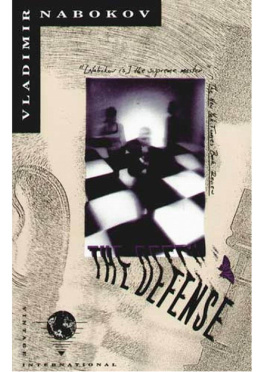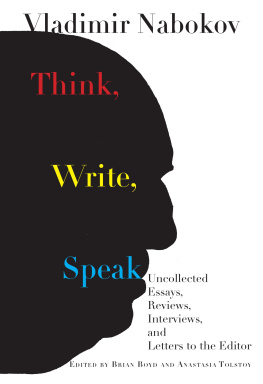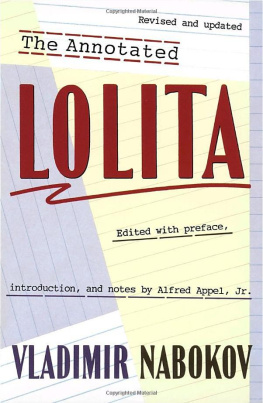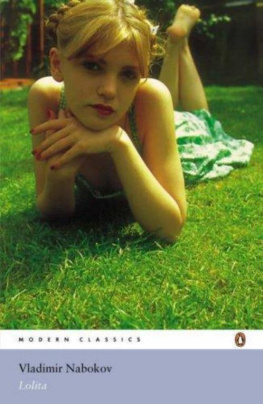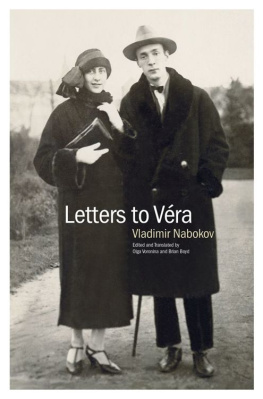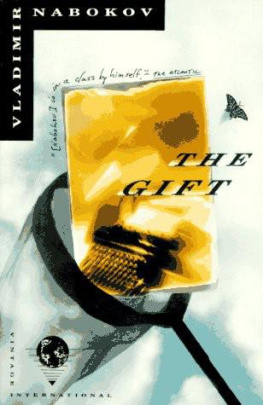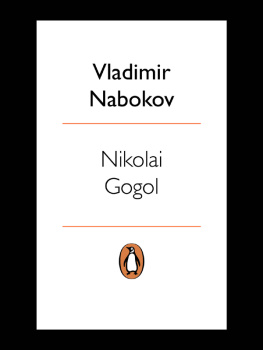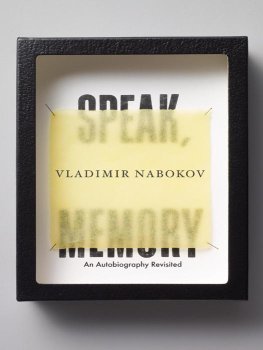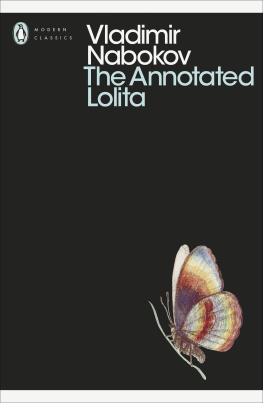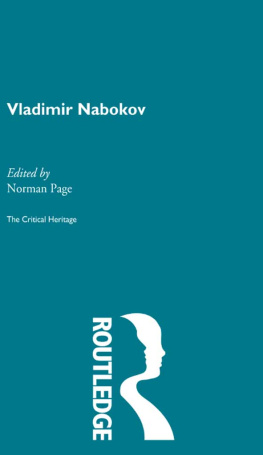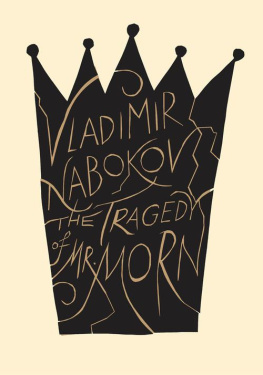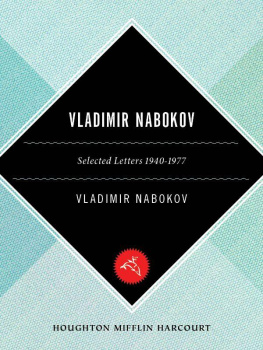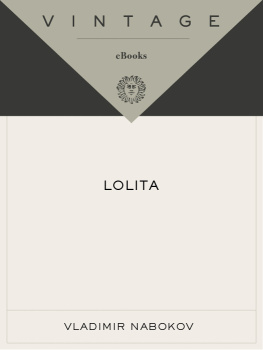Vladimir Nabokov - The Defense
Here you can read online Vladimir Nabokov - The Defense full text of the book (entire story) in english for free. Download pdf and epub, get meaning, cover and reviews about this ebook. year: 1990, publisher: Vintage Books, genre: Detective and thriller. Description of the work, (preface) as well as reviews are available. Best literature library LitArk.com created for fans of good reading and offers a wide selection of genres:
Romance novel
Science fiction
Adventure
Detective
Science
History
Home and family
Prose
Art
Politics
Computer
Non-fiction
Religion
Business
Children
Humor
Choose a favorite category and find really read worthwhile books. Enjoy immersion in the world of imagination, feel the emotions of the characters or learn something new for yourself, make an fascinating discovery.
- Book:The Defense
- Author:
- Publisher:Vintage Books
- Genre:
- Year:1990
- Rating:3 / 5
- Favourites:Add to favourites
- Your mark:
- 60
- 1
- 2
- 3
- 4
- 5
The Defense: summary, description and annotation
We offer to read an annotation, description, summary or preface (depends on what the author of the book "The Defense" wrote himself). If you haven't found the necessary information about the book — write in the comments, we will try to find it.
The Defense — read online for free the complete book (whole text) full work
Below is the text of the book, divided by pages. System saving the place of the last page read, allows you to conveniently read the book "The Defense" online for free, without having to search again every time where you left off. Put a bookmark, and you can go to the page where you finished reading at any time.
Font size:
Interval:
Bookmark:
3@L"/>@page { margin-bottom: 5.000000pt; margin-top: 5.000000pt; }
Vladimir Nabokov
The Defence
translated by Michael Scammell in collaboration with theauthor
to Vra
Foreword
The Russian title of this novel is Zashchita Luzhina, which means
'the Luzhin defense' and refers to a chess defense supposedly invented by my creature, Grandmaster Luzhin: the name rhymes with 'illusion' if pronounced thickly enough to deepen the 'u' into 'oo'. I began writing it in the spring of 1929, at Le Boulou a small spa in the Pyrenees Orientales where I was hunting butterflies and finished it the same year in Berlin. I remember with special limpidity a sloping slab of rock, in the ulex- and ilex-clad hills, where the main thematic idea of the book first came to me. Some curious additional information might be given if I took myself more seriously.
Zashchita Luzhina under my penname, 'V. Sirin,' ran in the migr Russian quarterly Sovremennye Zapiski (Paris) and immediately afterwards was brought out in book form by the migr publishing house Slovo (Berlin, 1930). That paper-bound edition, 234 pp., 21 by 4
cm., jacket a solid dull black with gilt lettering, is now rare and may grow even rarer.
Poor Luzhin has had to wait thirty-five years for an English-language edition. True, there was a promising flurry in the late thirties when an American publisher showed interest in it, but he turned out to belong to the type of publisher who dreams of becoming a male muse to his author, and our brief conjunction ended abruptly upon his suggesting I replace chess by music and make Luzhin a demented violinist.
Rereading this novel today, replaying the moves of its plot. I feel rather like Anderssen fondly recalling his sacrifice of both Rooks to the unfortunate and noble Kieseritsky who is doomed to accept it over and over again through an infinity of textbooks, with a question mark for monument. My story was difficult to compose, but I greatly enjoyed taking advantage of this or that image and scene to introduce a fatal pattern into Luzhin's life and to endow the description of a garden, a journey, a sequence of humdrum events, with the semblance of a game of skill, and, especially in the final chapters, with that of a regular chess attack demolishing the innermost elements of the poor fellow's sanity.
In this connection, I would like to spare the time and effort of hack reviewers and, generally, persons who move their lips when reading and cannot be expected to tackle a dialogueless novel when so much can be gleaned from its foreword by drawing their attention to the first appearance of the frosted-window theme (associated with Luzhin's suicide, or rather suimate) as early as Chapter Eleven, or to the pathetic way my morose grandmaster remembers his professional journeys not in terms of sunburst luggage labels and magic-lantern shots but in terms of the tiles in different hotel bathrooms and corridor toilets that floor with the white and blue squares where he found and scanned from his throne imaginary continuations of the match game in progress; or a teasingly asymmetrical, commercially called 'agate', pattern with a knight move of three harlequin colors interrupting here and there the neutral tint of the otherwise regularly checkered linoleum between Rodin's 'Thinker' and the door; or certain large glossy-black and yellow rectangles whose H-file was painfully cut off by the ocher vertical of the hot-water pipe; or that palatial water closer on whose lovely marble flags he recognized, intact, the shadowy figurations of the exact position he had brooded upon, chin on fist, one night many years ago. But the chess effects I planted are distinguishable not only in these separate scenes; their concatenation can be found in the basic structure of this attractive novel. Thus toward the end of Chapter Four an unexpected move is made by me in a corner of the board, sixteen years elapse in the course of one paragraph, and Luzhin, suddenly promoted to seedy manhood and transferred to a German resort, is discovered at a garden table, pointing out with his cane a remembered hotel window (not the last glass square in his life) and talking to somebody (a woman, if we judge by the handbag on the iron table) whom we do not meet till Chapter Six. The retrospective theme begun in Chapter Four shades now into the image of Luzhin's late father, whose own past is taken up in Chapter Five when he, in his turn, is perceived recalling his son's early chess career and stylizing it in his mind so as to make of it a sentimental tale for the young. We switch back to the Kurhaus in Chapter Six and find Luzhin still fiddling with the handbag and still addressing his blurry companion whereupon she unblurs, takes it away from him, mentions Luzhin senior's death, and becomes a distinct part of the design. The entire sequence of moves in these three control chapters reminds one or should remind one of a certain type of chess problem where the point is not merely the finding of a mate in so many moves, but what is termed 'retrograde analysis,' the solver being required to prove from a back-cast study of the diagram position that Black's last move could not have been castling or must have been the capture of a white Pawn en passant.
It is unnecessary to enlarge, in this elementary Foreword, on the more complex aspects of my chessmen and lines of play. But the following must be said. Of all my Russian books, The Defense contains and diffuses the greatest 'warmth' which may seem odd seeing how supremely abstract chess is supposed to be. In point of fact, Luzhin has been found lovable even by those who understand nothing about chess and/or detest all my other books. He is uncouth, unwashed, uncomely
but as my gentle young lady (a dear girl in her own right) so quickly notices, there is something in him that transcends both the coarseness of his gray flesh and the sterility of his recondite genius.
In the Prefaces I have been writing of late for the English-language editions of my Russian novels (and there are more to come) I have made it a rule to address a few words of encouragement to the Viennese delegation. The present Foreword shall not be an exception.
Analysts and analyzed will enjoy, I hope, certain details of the treatment Luzhin is subjected to after his breakdown (such as the curative insinuation that a chess player sees Mom in his Queen and Pop in his opponent's King), and the little Freudian who mistakes a Pixlok set for the key to a novel will no doubt continue to identify my characters with his comic-book notion of my parents, sweethearts and serial selves. For the benefit of such sleuths I may as well confess that I gave Luzhin my French governess, my pocket chess set, my sweet temper, and the stone of the peach I plucked in my own walled garden.
Vladimir Nabokov
Montreux
Dec. 15, 1963
3@L"/>@page { margin-bottom: 5.000000pt; margin-top: 5.000000pt; }
What struck him most was the fact that from Monday on he would be Luzhin. His father the real Luzhin, the elderly Luzhin, the writer, of books left the nursery with a smile, rubbing his hands (already smeared for the night with transparent cold cream), and with his suede-slippered evening gait padded back to his bedroom. His wife lay in bed. She half raised herself and said: 'Well, how did it go?' He removed his gray dressing gown and replied: 'We managed. Took it calmly. Ouf... that's a real weight off my shoulders.' 'How nice...' said his wife, slowly drawing the silk blanket over her. 'Thank goodness, thank goodness...
It was indeed a relief. The whole summer a swift country summer consisting in the main of three smells: lilac, new-mown hay, and dry leaves the whole summer they had debated the question of when and how to tell him, and they had kept putting it off so that it dragged on until the end of August. They had moved around him in apprehensively narrowing circles, but he had only to raise his head and his father would already be rapping with feigned interest on the barometer dial, where the hand always stood at storm, while his mother would sail away somewhere into the depths of the house, leaving all the doors open and forgetting the long, messy bunch of bluebells on the lid of the piano. The stout French governess who used to read
Next pageFont size:
Interval:
Bookmark:
Similar books «The Defense»
Look at similar books to The Defense. We have selected literature similar in name and meaning in the hope of providing readers with more options to find new, interesting, not yet read works.
Discussion, reviews of the book The Defense and just readers' own opinions. Leave your comments, write what you think about the work, its meaning or the main characters. Specify what exactly you liked and what you didn't like, and why you think so.

